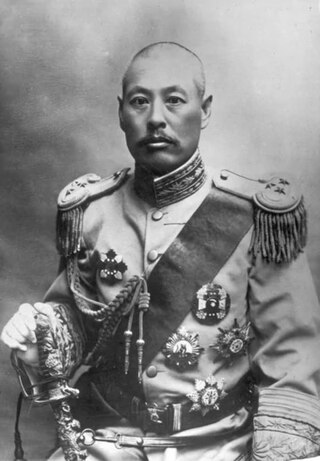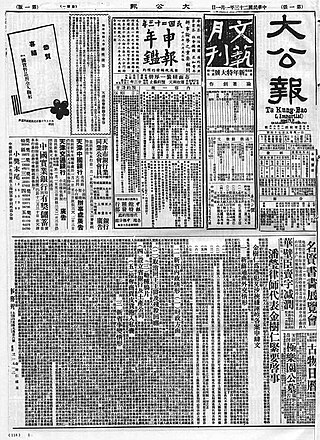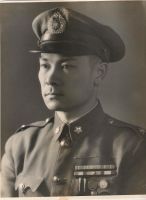This article needs additional citations for verification .(July 2018) |
| |||||
| Decades: | |||||
|---|---|---|---|---|---|
| See also: | Other events of 1939 History of China • Timeline • Years | ||||
Events in the year 1939 in China .
This article needs additional citations for verification .(July 2018) |
| |||||
| Decades: | |||||
|---|---|---|---|---|---|
| See also: | Other events of 1939 History of China • Timeline • Years | ||||
Events in the year 1939 in China .
This month, Chongqing National Government required the assembly of four commercial transport aircraft provided by US companies in Hong Kong, which was rejected by the British Hong Kong Government. [1]

Li Zongren, courtesy name Telin, was a prominent Chinese warlord based in Guangxi and Kuomintang (KMT) military commander during the Northern Expedition, Second Sino-Japanese War and Chinese Civil War. He served as vice-president and acting president of the Republic of China under the 1947 Constitution.

Wu Peifu was a Chinese warlord and major figure in the Warlord Era in China from 1916 to 1927.

Zhang Fakui was a Chinese Nationalist general who fought against northern warlords, the Imperial Japanese Army and Chinese Communist forces in his military career. He served as commander-in-chief of the 8th Army Group and commander-in-chief of NRA ground force before retiring in Hong Kong in 1949.

The term Free China, in the context of the Second Sino-Japanese War, refers to those areas of China not under the control of the Imperial Japanese Army or any of its puppet governments, such as Manchukuo, the Mengjiang government in Suiyuan and Chahar, or the Provisional Government of the Republic of China in Beiping. The term came into more frequent use after the Battle of Nanking, when Chiang Kai-shek evacuated the government of the Republic of China to Chungking. It was also sometimes referred to as the Chungking Government or simply "Chungking," such as in the surrender speech of Hirohito to the Japanese military.
In advanced traditional Chinese kung fu, Neijin refers to the conscious control of the practitioner's qi, or "life energy", to gain advantages in combat. Nèijìn is developed by using "Neigong", or "internal exercises," as opposed to "wàigōng", "external exercises."

Sir David Ronald Holmes was a British colonial government official who served in Hong Kong from 1938.
Events in the year 1949 in China.
Events in the year 1960 in the People's Republic of China.
Events in the year 1938 in China.
Events in the year 1946 in the Republic of China. This year is numbered Minguo 35 according to the official Republic of China calendar.
Events in the year 1941 in China.
Events in the year 1928 in China.
Events in the year 1940 in China.
Events from the year 1945 in the Republic of China. This year is numbered Minguo 34 according to the official Republic of China calendar.
Events in the year 1955 in China. The country had an estimated population of 605 million people.
Events in the year 1956 in China. The country had an estimated population of 620 million people.
The Jiaochangkou incident was a political riot that took place on 10 February 1946 in Jiaochangkou in the centre of Chongqing City, which was the wartime capital of the Republic of China and declared the second capital after the war by the Nationalist -led government. During 1945–46, KMT and the Chinese Communist Party (CCP) held political negotiations over the future of China in the city. The incident marked an open rivalry between the two parties, which eventually led to a civil war that ended up with a CCP victory.

The Wuhan Nationalist government, also known as the Wuhan government, Wuhan regime, or Hankow government, was a government dominated by the left-wing of the Nationalist or Kuomintang (KMT) Party of China that was based in Wuhan from 5 December 1926 to 21 September 1927, led first by Eugene Chen, and later by Wang Jingwei.

Ta Kung Pao is the longest-running Chinese newspaper in China and was one of the most influential newspapers of the Republic of China on the mainland.

Yu Yingqi was a Lieutenant General of the Republic of China Army. He was a senior general trained by the Kuomintang.